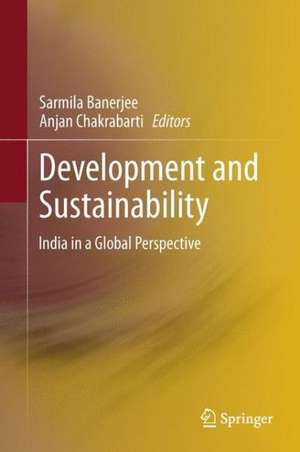Development and Sustainability: India in a Global Perspective
Editat de Sarmila Banerjee, Anjan Chakrabartien Limba Engleză Hardback – 21 mai 2013
| Toate formatele și edițiile | Preț | Express |
|---|---|---|
| Paperback (1) | 1233.06 lei 6-8 săpt. | |
| Springer India – 23 iun 2015 | 1233.06 lei 6-8 săpt. | |
| Hardback (1) | 1239.37 lei 6-8 săpt. | |
| Springer India – 21 mai 2013 | 1239.37 lei 6-8 săpt. |
Preț: 1239.37 lei
Preț vechi: 1511.42 lei
-18% Nou
Puncte Express: 1859
Preț estimativ în valută:
237.15€ • 248.27$ • 196.23£
237.15€ • 248.27$ • 196.23£
Carte tipărită la comandă
Livrare economică 05-19 aprilie
Preluare comenzi: 021 569.72.76
Specificații
ISBN-13: 9788132211235
ISBN-10: 8132211235
Pagini: 640
Ilustrații: XIX, 617 p.
Dimensiuni: 155 x 235 x 40 mm
Greutate: 1.07 kg
Ediția:2013
Editura: Springer India
Colecția Springer
Locul publicării:New Delhi, India
ISBN-10: 8132211235
Pagini: 640
Ilustrații: XIX, 617 p.
Dimensiuni: 155 x 235 x 40 mm
Greutate: 1.07 kg
Ediția:2013
Editura: Springer India
Colecția Springer
Locul publicării:New Delhi, India
Public țintă
ResearchCuprins
Chapter 1: Introduction.- Chapter 2: Rethinking and Theorizing the Indian State In the context of New Economic Map.- Chapter 3: Global Financial Crisis: What Did We Know, What Have We Learnt?.- Chapter 4: Volatility, Long Memory and Chaos: A Discussion on some “Stylized Facts” in Financial Markets with a focus on High Frequency Data.- Chapter 5: Globalization and Labour Markets.- Chapter 6: Production Performance of Indian Agriculture In the Era of Economic Reforms.- Chapter 7: Under the Shadow: Pricing and Marketing in Indian Agriculture in Globalisation.- Chapter 8: Promoting Entrepreneurship among Women in Agriculture.- Chapter 9: Construction & Engineering Industry of India in PPP Regime With a Special Focus on Airport Development.- Chapter 10: Performance Evaluation Techniques: An Application to Indian Garments Industry.- Chapter 11: Telecommunications Industry in the Era of Globalization with Special Reference to India.- Chapter 12: Market Structure of Crude Steel Industry and India’s Position in the Era of Globalization.- Chapter 13: Nabadiganta - A new horizon? Patriarchy, Globalization and women’s agency in the IT sector.- Chapter 14: Dualism in the Informal Economy: Exploring the Indian informal manufacturing sector.- Chapter 15: Indian Gems and Jewellery Industry: An Enquiry into the Nature of Competitive Advantage.- Chapter 16: On Assessment of Women Empowerment at Individual Level: An Analytical Exposition.- Chapter 17: Sustainable Poverty Reduction: Credit for the Poor.- Chapter 18: Employment Guarantee and Natural Vulnerability: A Study of MGNREGA in Indian Sundarbans.- Chapter 19: Inequality, Public Service Provision and Exclusion of the Poor.- Chapter 20: Stakeholder Attitudes and Conservation of Natural Resources: Exploring Alternative Approaches.- Chapter 21: Indoor Air Pollution and Incidence of Morbidity: A Study on Urban West Bengal.- Chapter 22: Efficient Pollution Management through CETP: The Case of Calcutta Leather Complex.- Chapter 23: Embracing the Global Knowledge Economy: Challenges facing Indian Higher Education.- Chapter 24: HIV Epidemic: Global Response and India’s Policy.- Chapter 25: The Political Economy of Mental Health in India.
Recenzii
“The edited volume under review focuses on thechanging contour of the Indian economy while globalization and sustainabilitywere selected as the two points of entry. … The volume will prove to be atreasure trove for sincere readers of the Indian economy as well as forresearchers keen on picking up new techniques or interested in derivingdistinct analytical insights.” (Sarmishtha Sen, Journal of Economics andPolitical Economy, Vol. 2 (3), September, 2015)
"The essays in this volume, which study a very wide range of different aspects of the Indian economy, provide an exceptionally rich intellectual fare to the reader. They yield numerous insights and are uniformly stimulating irrespective of whether one agrees with all the arguments and conclusions. The editors, Professors Sarmila Banerjee and Anjan Chakrabarti, deserve our gratitude for this very valuable collection of essays on the Indian economy."
Prasanta K. Pattanaik
Professor of the Graduate Division,
Department of Economics,
University of California, Riverside
“The Indian economy has entered a new liberalized regime of development following the unprecedented economic crisis of 1991. This edited volume offers a stimulating discussion on some major developments observed to have taken place in the economy during the first two decades of the post-liberalization era, with a focus on the associated sustainability issues. The individual papers of the volume deal with a variety of topics in areas of role of the state, integration of Indian markets with their global counterparts, emerging issues in agriculture, infrastructure and industry, social sector development, resource and environment, and finally, exclusion and social security, which are based on careful researches that have used up to date data and methodology, as required. These papers have drawn important conclusions which may induce a new perspective of viewing the Indian economy that has been emerging. This volume should therefore be a valuable reading for those interested in the study of Indian economic development and, in particular, for M. Phil and Ph. D. students of universities, as guidance for their research on Indian economic issues.”
Dipankor Coondoo
Retired Professor of Economics, Indian Statistical Institute
Honorary Visiting Professor, Institute of Development Studies Kolkata
"The essays in this volume, which study a very wide range of different aspects of the Indian economy, provide an exceptionally rich intellectual fare to the reader. They yield numerous insights and are uniformly stimulating irrespective of whether one agrees with all the arguments and conclusions. The editors, Professors Sarmila Banerjee and Anjan Chakrabarti, deserve our gratitude for this very valuable collection of essays on the Indian economy."
Prasanta K. Pattanaik
Professor of the Graduate Division,
Department of Economics,
University of California, Riverside
“The Indian economy has entered a new liberalized regime of development following the unprecedented economic crisis of 1991. This edited volume offers a stimulating discussion on some major developments observed to have taken place in the economy during the first two decades of the post-liberalization era, with a focus on the associated sustainability issues. The individual papers of the volume deal with a variety of topics in areas of role of the state, integration of Indian markets with their global counterparts, emerging issues in agriculture, infrastructure and industry, social sector development, resource and environment, and finally, exclusion and social security, which are based on careful researches that have used up to date data and methodology, as required. These papers have drawn important conclusions which may induce a new perspective of viewing the Indian economy that has been emerging. This volume should therefore be a valuable reading for those interested in the study of Indian economic development and, in particular, for M. Phil and Ph. D. students of universities, as guidance for their research on Indian economic issues.”
Dipankor Coondoo
Retired Professor of Economics, Indian Statistical Institute
Honorary Visiting Professor, Institute of Development Studies Kolkata
Notă biografică
Sarmila Banerjee is currently the Rajiv Gandhi Chair Professor of Eco-systems and Sustainable Development at the University of Calcutta. She has served in the Faculty of Economics at the same institution for more than three decades. She obtained her Ph.D. degree in Economics from the University of Florida, Gainesville, USA and carried out her post-doctoral research on Environmental Economics at the University of California, Santa Barbara, USA. Her teaching interest focuses on Econometrics and Environmental Economics; her research interest is primarily in Quantitative Aspects of Sustainable Development. She is the coordinator of the UGC-SAP program in her Department and Convener of the University of Calcutta’s Ph.D. Program in Economics. She is connected with different academic institutions and research networks in India and abroad through her active involvement in capacity building and curriculum development.
Anjan Chakrabarti received his PhD in Economics from the University of California, Riverside and is currently a Professor of Economics at the University of Calcutta. He is the Chairperson of the Undergraduate Board of Studies in Economics and a Committee Member of the University of Calcutta’s Ph. D. Program in Economics. His teaching interest is in Political Economics, History of Economic Ideas and Macroeconomics, while his research interest revolves around Political Economy, Development Economics, Indian Economics and Political Philosophy. He has published five books and over thirty academic articles to date. His published books include ‘Transition and Development in India’ and ‘Dislocation and Resettlement in Development: From Third World to World of the Third,’ both from Routledge, and ‘World of the Third and Global Capitalism” from Worldview Press. He is the recipient of Dr. V.K.R.V. Rao Prize in Social Science Research in Economics for the year 2008.
Anjan Chakrabarti received his PhD in Economics from the University of California, Riverside and is currently a Professor of Economics at the University of Calcutta. He is the Chairperson of the Undergraduate Board of Studies in Economics and a Committee Member of the University of Calcutta’s Ph. D. Program in Economics. His teaching interest is in Political Economics, History of Economic Ideas and Macroeconomics, while his research interest revolves around Political Economy, Development Economics, Indian Economics and Political Philosophy. He has published five books and over thirty academic articles to date. His published books include ‘Transition and Development in India’ and ‘Dislocation and Resettlement in Development: From Third World to World of the Third,’ both from Routledge, and ‘World of the Third and Global Capitalism” from Worldview Press. He is the recipient of Dr. V.K.R.V. Rao Prize in Social Science Research in Economics for the year 2008.
Textul de pe ultima copertă
Following the reforms undertaken in the last two decades, India’s economic landscape has been radically transformed. This book examines the new economic map, which is shown to be shaped by two intertwined currents: globalization and sustainability. Weaving extensively through these currents and the canvas of development in the Indian economy they open up, this work seeks to introduce new methodologies, a corpus of concepts and modes of analysis to make sense of the emerging order of things. What transpires in the course of the investigation is a critical reflection of the present in which not only the new institutions, policies and practices are analyzed, but their limitations, fragility and at times myopic approaches are brought to light. By highlighting the rough edges created by the new conditions, this book is firmly engaged with the frontier of the Indian economy and ends up challenging many well-known conjectures and assumptions. In doing so, it strives to shift the Indian economy to a new terrain, thereby fundamentally re-locating and re-orienting the discourse of that economy as a unique object of analysis.
Caracteristici
Aims to provide a preliminary guide for M. Phil and PhD students, exploring numerous researchable topics for dissertations with an emphasis on Indian economics
Indicates the need to ensure correspondence between the research issue and the research method by picking up suitable illustrative problems from “global India”
Reshapes methodologies, tools and mode of analysis of “thinking and doing” Indian economics, leading to new questions and insights in the field
Indicates the need to ensure correspondence between the research issue and the research method by picking up suitable illustrative problems from “global India”
Reshapes methodologies, tools and mode of analysis of “thinking and doing” Indian economics, leading to new questions and insights in the field













